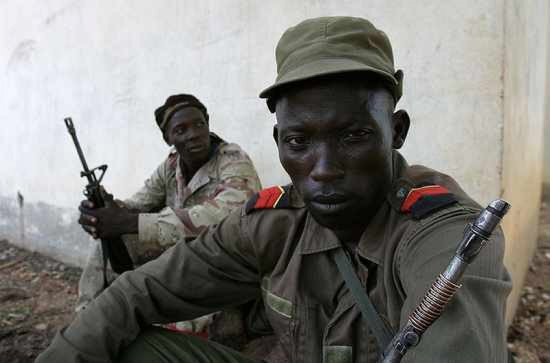Militants From All Sides Plague The Remote Central African Republic

The Central African Republic is one of the world’s most inaccessible countries. It is landlocked deep in the heart of the African continent, encompassing about 240,000 square miles. The jungles are thick, the roads are mostly unpaved and the ocean is hundreds of miles away.
But that hasn’t stopped the country from becoming a haven for opportunistic militants who take advantage of instability to achieve their own ends. Those who aren’t already based in CAR come in from all sides, across porous borders from neighboring countries like Sudan, South Sudan, Chad and the Democratic Republic of the Congo.
In the south, the notorious Lord’s Resistance Army from Uganda is terrorizing civilians in towns and villages unprotected by security forces. And in the north, a fractious coalition of rebel groups seized several cities this week, prompting an intervention from Chad at the CAR administration’s behest.
“It’s a very complicated situation since there are so many insurgent groups,” says Ashley Benner, a policy analyst for the Washington-based advocacy group Enough Project, which focuses on human rights issues in Africa.
“The police and the army are really under-resourced, despite the wealth of natural resources the country has. They don’t really have the capability to stop rebel leaders.”
Poverty is rife in CAR, even though the land is rich with gold, diamonds, uranium and oil. Turmoil has hindered development ever since the country gained independence from France in 1960, and current President Francois Bozize is only the latest leader to ascend to power via coup d’état. Troops from Chad helped install him in the capital city of Bangui in 2003, and the two administrations remain allies.
A coalition of northern rebel forces advanced in a zigzag route southward this month to capture the eastern cities of Ndele, Sam-Ouandja, Ouadda and Bamingui. This week, they went further down to seize Bria, a major site for diamond mining. Bozize has called on his northern neighbor for assistance, and the response came quickly: About 2,000 Chadian troops filed into CAR on Tuesday.
The rebels so far show no signs of backing down. The perpetrators of this latest offensive come from several groups; they refer to themselves collectively as Seleka, which means "alliance" in the Sangho lingua franca.
One faction comes from an insurgent group called the Union of Democratic Forces for Unity, which is known by its French acronym UFDR. Another peeled off from an organization called the Convention of Patriots for Justice and Peace, or CPJP. Both of those groups have been involved in insurgencies of years past, but were temporarily mollified with peace agreements and, in some cases, absorbed into the national army. Another Seleka faction comes from a group called the Wa Kodro Salute Patriotic Convention, or CPSK.
Seleka militants say they want the administration in Bangui to abide by old peace agreements, and to devote more resources to development in CAR. They threaten to topple the government if their demands are not met. In a statement this week, they described a “thirst for justice, for peace, for security and for economic development of the people of Central African Republic.”
Bozize hopes that Chadian forces can stop the insurgents from migrating toward the southwestern capital – and that’s not his only worry. In the south, an older rebel movement is putting down new roots.
Infiltration by the Lord’s Resistance Army might seem an unlikely problem for CAR to have. The group originated hundreds of miles away in Uganda back in 1987, with the goal of toppling President Yoweri Museveni. But within the past five years, the LRA’s reach has expanded to the CAR and nearby countries. Its leader Joseph Kony has been charged with war crimes by the International Criminal Court; his sprawling but weakened militia is notorious for recruiting child soldiers, forcing girls into sexual slavery and committing brutal atrocities – including rapes, abductions, amputations and executions – against civilians.
Unlike the northern insurgents, LRA militants aren’t gunning for Bangui. They have stayed far from the capital and its security forces, which has enabled them to escape prosecution in CAR.
“The LRA has been primarily focused on the southeastern section of the Central Africa Republic, which is hundreds of miles from Bangui,” says Benner. “There’s very little police presence there.”
That’s not to say the rebels have total free rein. As Chadians move in to stabilize the north this week, the U.S. military is working to assist CAR troops in securing the southeast. Since last year, American troops have been stationed at a forward operating location in the Obo region, which borders the DR Congo.
“The U.S. military advisers that President [Barack] Obama announced he would deploy in October of 2011 are focusing a lot of effort on the Central African Republic,” says Benner, adding that public awareness campaigns to encourage defections are having a positive effect. “We’ve seen a lot of progress recently; more people are leaving the LRA.”
Still, a long-term solution is a long way off. A stronger CAR administration might help to quash rebel atrocities in the north and south, but decades of turmoil have kept the central government weak, not to mention burdened by endemic corruption. The annual disbursement of tens of millions of dollars in aid from the United States and other donors hasn’t done much to change CAR’s fundamental problems.
Analysts fear that this latest insurgent push in the north might topple the government, paving the way for yet another coup in this chronically failed state. One CAR senior military officer even told Agence France-Presse that the administration was powerless in the face of militant offensives.
"Once it starts,” he said, “only a foreign intervention can save the regime.”
© Copyright IBTimes 2024. All rights reserved.






















